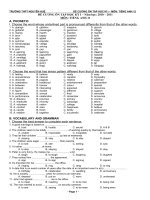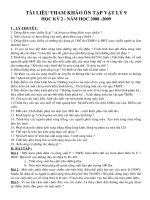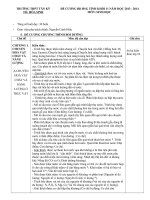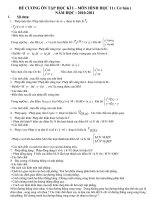Đề cương ôn tập HK1 môn Tiếng Anh 9 năm 2020-2021 - Trường THCS Giá Rai A
Bạn đang xem bản rút gọn của tài liệu. Xem và tải ngay bản đầy đủ của tài liệu tại đây (438.37 KB, 7 trang )
ĐỀ CƯƠNG ƠN TẬP CUỐI HỌC KÌ I LỚP 9
Năm Học: 2020 -2021
A. Speaking:
Topic 1: Talk about school uniforms.
Topic 2:. Talk about your last vacation
Topic 3: Talk about the benefits of the internet.
B. Listening
Task 1: Listen and choose the best option A, B, C or D / Listen and match.
Task 2: True or False? Check ( ) the boxes / Listen and complete the passage.
C. Language Focus
Choose the best option A, B, C or D to complete each sentence.
1. Tenses:
a. The past simple tense
S + was / were + O
-> He was in class 8A last year.
S + V-ed / V2 + O
-> She lived here 2 years ago.
Adv: yesterday, last week, last Sunday, ago, in 2007.....
b.The present perfect tense
S+ have/ has + p.p (V-ed /V 3) +O
-> I have just invited to her birthday party .
Adv: just, already, ever, never, since, for, yet (already: is used in affirmatives, ever: in questions,
yet: in questions and negatives)
2. Passive voice:
a/ Simple present tense
She makes a cake. -> A cake is made by her
(P )
S + is /am are + Ved/3 + by + O
b/ Simple past tense :
He bought a new car. -> A new car was bought by him.
(P )
S+
was /were + Ved/3 + by + O
c / Modal verbs : Will / shall /can / could /must/ should /may / might / have to / used to / be going
to
My mother will give me a new bike. -> A new bike will be given by my mother.
(P )
S+
Modal verb +be + Ved/3 + by +
O
d / Present perfect tense :
My father has grown flowers in the garden.
-> Flowers in the garden have been grown by my father
(P)
S + have / has + been + Ved/3 + by + O
3. Reported speech / Indirect speech:
Cách chuyển từ câu trực tiếp sang câu gián tiếp
Thay đổi về thì
Thay đổi trạng từ chỉ thời gian và nơi
chốn
Simple present
Simple past
This/ These
That/ Those
Present progressive Past progressive
Here
There
Will
Would
Now
Then
Must
Had to
Today/ Tonight
That day/ That night
Can
Could
Tomorrow
The next day/ the
1
following day
May
Might
Last
Before
Thay đổi đại từ chỉ ngôi: Phụ thuộc vào chủ ngữ và tân ngữ của mệnh đề chính.
I
->
nguoi nói
You
-> nguoi nghe
We
->
They
He /She /they -> He /She /They
*. Yes /No -question:
a) S + asked + O: “Do / does + S +V 1 + O ..........? “
S + asked + O + If /Whether + S + V 2 / V-ed + O
Ex: Ba asked Hoa: “Do you live near here?” Ba asked Hoa if/whether she lived near there.
b) S + asked + O: “Động từ khiếm khuyết như can, will + S + O ..........? “
S + asked + O + If /whether + S + động từ khiếm khuyết ở QK + V1+ O.
Ex: Hoa asked Ba: “Can you do this exercise?” Hoa asked Ba if/whether he could do that
exercise.
c) S + asked + O: “Is/are/am + S..?”
S + asked + O + If /whether + S + was/were…
Ex: He asked me: “Are you a student?” He asked me if/whether I was a student.
* . Wh-question:
S + asked + O : “Question word + Do / does + S +V 1 + O ..........? “
S + asked + O + Question word + S + V 2 / V-ed + O.
Ex: Ba asked Hoa: “What do we have for this breakfast?” Ba asked Hoa what they had for that
breakfast.
S + asked + O : “Question word+động từ đặc biệt + S + O ..........? “
S + asked + O + Question word + S + động từ đặc biệt ở QK + V1+ O.
Ex: Ba asked Hoa: “What can we do now?” Ex: Ba asked Hoa
4. Wish- sentences: (Câu mơ ước)
- About present: S + wish/ wishes + S + V-ed /2 + O. ( be: were )
- About an ability in the future: S + wish/wishes + S could/would + V1
Ex: I can’t speak English fluently. I wish I could speak English fluently.
5. Modal verbs with ‘if’ :
If + S + V(hiện tại) + …., S + will / have to/ can/ may ..+ V0 +…
Ex: - If she learns hard, she can pass the exam .
- He won’t get the accident if he doesn’t drive fast.
1. If I see him, I ___________ (give ) him a gift.
2. If I _____ (find) a cheap room, I will stay a fortnight.
3) She won’t forget to pick you up if you ……………….(not/ phone) her.
4. If we send an invitation, our friends........................( come) to our party.
5. If the sun _____, we _____for a walk.
A. shines / will go
B. shine / will go C. shining / would go D. will shine / go
6. You’ll fail the exam _____ you don’t work hard .
A. if
B. until
C. when
D. why
7. She …….her parents if she ……….to school today.
A. visit / will go B. visits / will go C. will visit / doesn’t go D. visit / doesn’t go
2
6. Prepositions of time: Giới từ chỉ thời gian
- In + century (in the 18th century)/ decade (in the 1990s) / season (in the summer)/ month(in
January) / parts of day(in the morning)/
- On + days of the week(on Wednesday)/ dates (on October)/ that day/ Monday morning/
- At + time of day (at 6pm)/ night/ noon/ midday/ Christmas/ two or three days/ lunch/ dinner/
breakfast.
- For + duration of time ( khoảng thời gian)
- Since + point in time (mốc thời gian)
- From …to
- Between … and
- Till/ Untill + point in time
Ex 2. Choose the correct prepositions of time:
1. My exam is ………….2 o’clock ……………….Monday.
2. We’ve been waiting here …………………ten minutes.
3. Are you leaving ………………Saturday morning?
4. My father worked in a bank ………………….five years.
5. My uncle and aunt are on holiday……………………..August.
6. I always visit my parents ……………………Christmas.
7. Mike usually plays football …………………the weekend.
8. You’ve known me ………………….ten years.
9. I was born …………….January 3rd ………………1986.
10. I haven’t seen John ……………………he got married.
11. I’d like to book a table …………………6.30 this evening
7. Adverb clauses of result (mệnh đề trạng từ chỉ hậu quả)
S + V + ………, so/ therefore + S + V +……..
Ex: We arrived late, so we missed the beginning of the film. (Chúng tơi đến trễ, vì thế chúng tơi
bỏ lỡ phần đầu của bộ phim)
It's a very fine day, therefore we decide to go for a picnic. ( Hôm nay là một ngày đẹp trời, vì vậy
chúng tơi quyết định đi dã ngoại )
1. The computer didn't work, ……… he took it back to the shop.
A. because
B. so
C. but
D. since
2. It rains heavily,………. we don’t go camping.
A. therefore
B. for
C. because
D. of
3. They get up quite late , ………….. They missed the train .
a. and
b. but
c. so
d. although
4. The students in grade 9 worked extremely hard , …. They passed the examination easily.
a. so
b. but
c. and
d. because
8. Vocabulary:
D. Reading:
Task 1: Read the passage then choose the correct option / True or False? Check ( ) the boxes.
Task 2: Read the passage then answer the questions..
E. Writing:
Task 1: Use the provided words or phrases to write a complete paragraph / letter.
Task 2: Put the words or phrases in correct order to make meaningful sentences.
3
B. EXERCISES:
I.Choose the best option ( A, B, C, or D ) to complete each sentence.
1.Tom said that he …………..Vietnamese spelling difficult to learn.
A. found
B. will find
C. finds
D. finding
2. He…………….to her party last night.
A. is invited
B. invites
C. invited
D. was invited
3. I will be received a present by my mother,..............I study well .
A. so
B. whether
C. how
D. if
4. We…………..many people since we came here in June.
A. met
B. have met
C. meet
D. will meet
th
5. We intend to have a picnic…… December 20 .
A. on
B. in
C. between
D. at
6. They wish they…………..a new house.
A. have
B. will have
C. can have
D. had
7. Tomatoes should...............in the spring.
A. to be planted
B. plant
C. be planted D. be plant
8. I don’t have a bike,………… I walk to school .
A. so
B. however
C. because
D. but
9. He ……………… English for 4 years.
A. learns
B. learnt
C. will learn
D. has learnt
10. He was ill , ……..he didn’t go to school yesterday .
A. so
B. because
C. but
D. for
11. The students will visit the capital … summer .
A. on
B . in
C. at
D. with
12. That little girl wishes she …….. enough money to by that toys.
A. has
B. had
C. will have
D. to have
13. The photos……………….in London studio last week.
A. have been
B. was taken
C. have taken
D. were taken
14. The car……………..by my father yesterday.
A. was wased
B. were wased
C. has been wased D. wased
15. She told me she ……..to go to Hanoi the following day.
A. will have
B. would have
C. has
D. had
16. If I have enough money , I……………..Ha Long bay next summer vacation.
A. will visit
B. visit
C. will visits
D. visits
17. I wish they ……………….. here tomorrow.
A. will come
B. would come
C. come
D. came
18. They heard a very strange noise … midnight .
A. on
B. in
C. at
D. for
19. I didn’t study hard , ……… I failed the exam yesterday .
A. so
B. but
C. because
D. however
20. If she has a lot of money, she …………..around the world .
A. visit
B. visits
C. will visit
D. will visits
21. He ……………… English for 4 years.
A. learns
B. learnt
C. will learn
D. has learnt
22. Math and Literature are ……………… subjects for children in Vietnam.
A. primary
B. compulsory
C. optional
D. National
4
II. Read the following passage and answer the questions below:
Like other languages, English is always changing, but it changes very slowly. People invent
new words, borrow words from other languages and change the meaning of words as needed. For
example, the English word "byte" was invented by computer specialists in 1959. The word
"tomato" was borrowed from Nahuati, an American Indian language spoken in Mexico. The word
"meat" once referred to food in general. People learn English as well as languages by listening,
copying what they hear, and using the language. Most school children learn their first language
easily and sometimes other languages as well.
Check T for true anh F for false.
1. English is changing very quickly.
_____________
2. Some English words are borrowed from other languages.
_____________
3. Some English words are invented by computers.
_____________
4. "Meat" means food in general.
_____________
5. One of the ways to learn English is copying what you hear
_____________
6.It is not easy for children to learn their first language.
_____________
Key
1. F (English is changing very slowly, not quickly)
2. T
3. F (Some English words are invented by computer specialists, not by computers)
4. F ("Meats" doesn't mean food in general. It used to but not now.)
5. T
6.
F (It is easy).
III. Read the passage and choose A, B, C or D as the best answers for the questions below.
Between the months of November and May, a wind blows from the West in most parts of
Indonesia. It comes from the ocean and carries rain. Clouds build up around the mountains, and
every afternoon rain falls. The rain is always heavy, and rivers can be walked across in the dry
season now become dangerous. When it rains the whole day, they may suddenly overflow and
cause great damage to the land.
Most farmers are glad when the wet season begins. There is water for their fields and they can
again start growing rice. But people in town are not so glad for the streets soon get muddy and
dirty. They prefer the dry seasons when they can sit outside and enjoy the cool evenings.
1. When is the wet season?
A. In May
B. In November
C. From November to May
D. From May to November
2. What causes the rainfall?
A. The ocean
C. The mountains
B. Clouds building up around the mountains
D. The afternoon
5
3. Why are many rivers dangerous in the wet season?
A. People try to cross them.
B. They are very big rivers.
C. They dry up and cannot provide enough water.
D. Long periods of heavy rain make them full.
4. What damages the land?
A. The sudden rain.
B. The overflow of the rivers.
C. The wet season.
D. The dry season.
5. Why can farmers start growing rice again?
A. The dry season has begun. B. The land has been damaged.
C. There is water again.
D. The rivers overflow.
6. Why are people in town not so happy?
A. They can sit outside.
B. They are muddy and dirty.
C. The evenings are cool.
D. The streets are full of mud.
Key
l. C 2. B 3. D 4. B 5. C 6. D
IV. Make sentences based on the given cues. See the example.
0. teacher/ told/ students/ there/ examination/ following week.
The teacher told the students that there would be an examination the following week.
1. Students/ said/ they/ not/ happy/ hear/ news.
__________________________________________________________
2. The teacher said/ students/ had/ follow/ school plan.
__________________________________________________________
3. They/ had/ work/ hard/ during/ Christmas.
__________________________________________________________
4. She/ said/ she/not/ ready/ examination.
__________________________________________________________
5. Other students/ said/ they/ happier/ if/ teacher/ delay/ exam.
__________________________________________________________
6. The teacher said/ time/ not/ changed.
__________________________________________________________
7. All students/ made/ sad/ news.
__________________________________________________________
8. One of /students/ told/ teacher/it/ Christmas/ following week.
6
Key
1. The students said that they were not happy to hear the news.
2. The teacher said that the students had to follow the school plan.
3. They had to work hard during Christmas.
4. She said that she was not ready for the examination.
5. The other students said that they would be happier if the teacher delayed the exam.
6. The teacher said that the time would not be changed.
7. All the students were made sad by the news.
8. One of the students told the teacher it would be Christmas the following week.
V. Use the provided words or phrases to write a complete
1. Old/ man/ wish/ his/ grandchild/ visit/ him/ more/ often.
____________________________________________________________
2. I/ wish/ you/ can/ spend/ more/ time/ on/ study.
____________________________________________________________
3. They/ wish/ their/ team/ be/champion.
____________________________________________________________
4. I/ wish/ I/ have/ more/ friend/ and/ I/ not/ be/ lonely.
____________________________________________________________
5. Mary/ wish/ her/ parents/ not/ have/ go/ on/ business/ trips/ so/ often.
____________________________________________________________
6. Many/ people/ wish/ they/ be/ wealthy/ but/ I/ do/ not.
____________________________________________________________
7. I/ wish/ my/ mother/ be/ less/ busy/ so that/ she/ have/ more/ time/ for/ me.
____________________________________________________________
8. Jim/ wish/ his/ parents/ not/ expect/ too/ much/ from/ him.
____________________________________________________________
Key
1. The old man wishes his grandchild visited him more often.
2I wish you could spend more time on study.
3. They wish their team was the champion.
4I wish I had more friend and I was not lonely.
5Mary wishes her parents did not have to go on business trips so often.
6. Many people wish they were wealthy but I don’t .
7. I wish my mother was less busy so that she had more time for me.
8. Jim wishes his parents did not expect too much from him.
7









